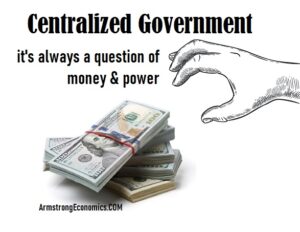The Age of Authoritarianism: How Centralized Governments are Stripping Local Power

In the annals of history, one stark reality persists: governments often succumb to their insatiable thirst for money and power. Each regime, despite the lessons of the past, believes it can defy this trend. This cycle begins with humble communities, growing into formal governments, and often spiraling into oppressive nation-states or empires. As a society evolves from a loose collection of communities to a centralized power, the urge to maintain dominance frequently leads to authoritarianism, especially as the ruling elite senses their grip on power weakening.
Lessons from History: The Words of Thomas Paine
One cannot discuss the pitfalls of centralized authority without evoking the name of Thomas Paine. His revolutionary treatise, Common Sense, ignited the flames of independence in the American colonies, emphasizing the profound disconnect between the government and the governed. “No taxation without representation!” became a rallying cry against a distant and disconnected ruling class. Paine eloquently articulated the dichotomy between society and government, stating:
“Society is produced by our wants, and government by our wickedness; the former promotes our POSITIVELY by uniting our affections, the latter NEGATIVELY by restraining our vices. The one encourages intercourse, the other creates distinctions.”
Indeed, as Paine pointed out, the essence of any government should be to represent the will of the people—something that our modern governments, both local and federal, seem to have forgotten.

The Current Landscape: The Erosion of Local Authority
Today, we face a concerning trend where centralized governments aim to diminish local autonomy, echoing the very grievances articulated by our forebearers. The issue of Home Rule has become increasingly critical, particularly in the United States, where state governments are attempting to override local decision-making. Local citizens find their rights to vote and self-governance stripped away, often under the guise of broader state interests.
Real estate developers, fueled by cash contributions to politicians, attempt to circumvent local zoning laws in pursuit of profit. These actions are perilous; they mirror the tyranny that sparked the American Revolution.
Power Grab: The Dillon’s Rule vs. Cooley Doctrine Debate
The debate around Dillon’s Rule—a legal principle stating that local governments can only exercise powers expressly granted to them by the state—highlights the pull of state supremacy. Dillon argued that municipal corporations derive their existence and power from state legislatures, effectively echoing the despotic rule from which the American Revolution sought liberation.
In stark contrast lies the Cooley Doctrine, which advocates for local self-determination as a fundamental right. Justice Thomas M. Cooley proclaimed in 1871:
“Local government is a matter of absolute right; and the state cannot take it away.”
This doctrine reflects the spirit of democracy, empowering citizens to determine the governance of their immediate communities.
The Modern Implications: A Warning from History
History warns us through unfortunate illustrations, most notably in Russia under Stalin. His regime systematically stripped autonomy from local governments within the Soviet Union, eradicating the self-governance that was initially promised. This wave of centralized power is akin to the contemporary trends observed in various states across America, where both blue and red states exhibit a growing inclination to impose top-down governance, sidelining community voices.

Why This Matters: The Right to Be Heard
The right to local governance, including the ability to voice dissent through due process, is essential to our democracy. In landmark cases like Londoner v. City and County of Denver, the U.S. Supreme Court established that property owners must have a chance to present objections before the imposition of taxes. This principle is foundational; it doesn’t merely ensure fairness but also safeguards the very fabric of our democracy.
Can Municipalities Secede From States?
The practicalities of municipalities attempting to secede from their states showcase the challenges faced by local governance. Though theoretically possible under strict constitutional conditions, historical precedents illustrate the cumbersome nature of this process. The U.S. Constitution stipulates that no new state may be formed within an existing state’s jurisdiction without state and Congressional consent, complicating potential secession efforts.
Even instances of successful municipal separations have faced legal and political hurdles, indicative of the prevailing sentiment towards maintaining the integrity of state boundaries.

The Whimsical Yet Insightful Tale of Key West
A humorous yet poignant case is that of the Conch Republic, where Key West residents, frustrated by a federal roadblock that stymied their tourism-dependent economy, mockingly declared independence from the United States in 1982. This satirical gesture spotlighted the need for local voices to be prioritized over centralized authority.
The Core Issue: Are We Headed Towards Authoritarianism?
What we witness today in many states is alarming. Centralized power grabs threaten local self-determination, echoing historical patterns that have led to the downfall of democracies. Regardless of political allegiance, citizens must remain vigilant.
Call to Action: Uphold Due Process Locally
As active participants in our democracy, we must demand that those in power respect our rights. Politicians who disregard local governance in pursuit of their agendas threaten the core principles upon which this nation was founded. Together, we can safeguard our freedoms and promote the sanctity of self-governance at the local level.
At Extreme Investor Network, we stand firm in advocating for local autonomy and the right to be heard. The time for change is now. Engage with us as we explore these vital issues further, and empower your community to take action against the encroachment of centralized power. Let us reclaim the ideals that led to the establishment of our great nation.

